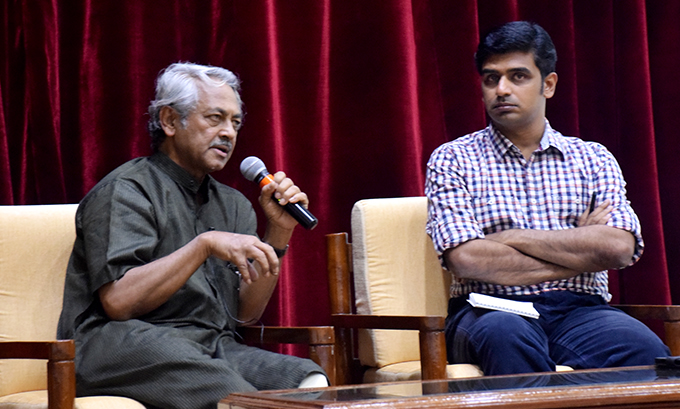Girish Kasaravalli launches Culture Connect at IIMB

Documentary on URA screened; students quiz award-winning filmmaker on the challenges of independent filmmakers and the idiom of his films

On the evening of October 25, Girish Kasaravalli, well known Indian film director, inaugurated the 'IIMB Culture Connect' talk series by screening his documentary on Professor U R Ananthamurthy and taking questions from an audience that had braved incessant rain and bad traffic snarls in the City to interact with him.
Girish Kasaravalli is considered one of the foremost filmmakers of modern India whose work stands at par with Satyajit Ray, Adoor Gopalakrishnan and Mrinal Sen. He has won the National Film Award for Best Feature Film four times: Ghatashraddha (1977), Tabarana Kathe (1986), Thaayi Saheba (1997) and Dweepa (2002). In 2011, he was decorated with the Padma Shri, the fourth highest civilian award by Government of India. His retrospectives have been held in many countries and he has won innumerable international accolades.
Abhaya Simha, whose debut film 'Gubbacchigalu' won the national award, introduced the IIMB audience to some striking aspects of Girish Kasaravalli's work. "I feel very humbled to speak of a filmmaker who has the stature of Mt. Everest but I will certainly try," said Abhaya, proceeding to give the audience interesting insights into the filmmaker's use of form, technique and imagery. "When I saw Girish sir's first film, which he had made while a student of FTII, I remember coming away with the haunting image of a lonely man in a sprawling bungalow; when I watched his most recent film I saw an equally haunting image of people jostling for space in a congested room," said Abhaya, to which Mr Kasaravalli responded with the remark that a filmmaker must hold a mirror to the times. "The sprawling houses of Teerthahalli, my hometown, in Shimoga district have left as deep an impression on me as the congested cubbyholes that pass off as houses in a city like Bangalore. Houses are characters in my films as much as light and shadow are," he added.
As both the moderator and the chief guest are products of the illustrious Film and Television Institute of India (FTII), Pune, conversation inevitably veered towards what the institute had offered them as filmmakers. "It (FTII) is not a grand place but it has history. It was once Prabhat Studio of V Shantaram," gently explained Mr Kasaravalli to a young man in the audience who complained that all he saw at FTII was a crumbling ill-kept building with a gloomy air. "I went there with my dad and I couldn't convince him that I'd have a bright future in such a gloomy place," said the young man. "Well," countered Kasaravalli, "I went there because I was passionate about films, and I certainly did not take my dad with me!"
Girish Kasaravalli launches Culture Connect at IIMB
Documentary on URA screened; students quiz award-winning filmmaker on the challenges of independent filmmakers and the idiom of his films

On the evening of October 25, Girish Kasaravalli, well known Indian film director, inaugurated the 'IIMB Culture Connect' talk series by screening his documentary on Professor U R Ananthamurthy and taking questions from an audience that had braved incessant rain and bad traffic snarls in the City to interact with him.
Girish Kasaravalli is considered one of the foremost filmmakers of modern India whose work stands at par with Satyajit Ray, Adoor Gopalakrishnan and Mrinal Sen. He has won the National Film Award for Best Feature Film four times: Ghatashraddha (1977), Tabarana Kathe (1986), Thaayi Saheba (1997) and Dweepa (2002). In 2011, he was decorated with the Padma Shri, the fourth highest civilian award by Government of India. His retrospectives have been held in many countries and he has won innumerable international accolades.
Abhaya Simha, whose debut film 'Gubbacchigalu' won the national award, introduced the IIMB audience to some striking aspects of Girish Kasaravalli's work. "I feel very humbled to speak of a filmmaker who has the stature of Mt. Everest but I will certainly try," said Abhaya, proceeding to give the audience interesting insights into the filmmaker's use of form, technique and imagery. "When I saw Girish sir's first film, which he had made while a student of FTII, I remember coming away with the haunting image of a lonely man in a sprawling bungalow; when I watched his most recent film I saw an equally haunting image of people jostling for space in a congested room," said Abhaya, to which Mr Kasaravalli responded with the remark that a filmmaker must hold a mirror to the times. "The sprawling houses of Teerthahalli, my hometown, in Shimoga district have left as deep an impression on me as the congested cubbyholes that pass off as houses in a city like Bangalore. Houses are characters in my films as much as light and shadow are," he added.
As both the moderator and the chief guest are products of the illustrious Film and Television Institute of India (FTII), Pune, conversation inevitably veered towards what the institute had offered them as filmmakers. "It (FTII) is not a grand place but it has history. It was once Prabhat Studio of V Shantaram," gently explained Mr Kasaravalli to a young man in the audience who complained that all he saw at FTII was a crumbling ill-kept building with a gloomy air. "I went there with my dad and I couldn't convince him that I'd have a bright future in such a gloomy place," said the young man. "Well," countered Kasaravalli, "I went there because I was passionate about films, and I certainly did not take my dad with me!"
